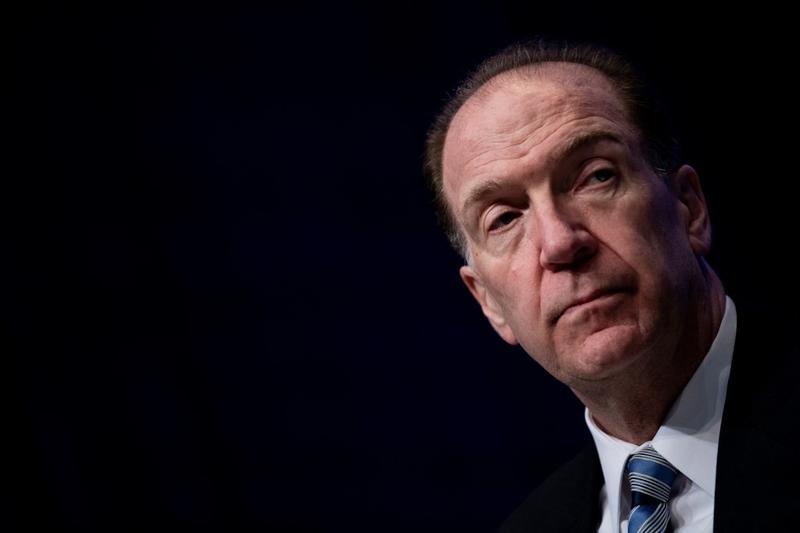 In this file photo, World Bank Group President David Malpass listens during an event at the World Bank February 10, 2020, in Washington, DC. The global economy is facing "staggeringly large" losses and the recovery effort is hampered by a shortage of resources to make up for the damage caused by the coronavirus pandemic, World Bank President David Malpass said on June 2, 2020. While the Washington-based development lender has rushed out new programs to deploy $160 billion in funding to 100 countries in an effort to addresses the immediate emergency, the crisis will force developing nations to rethink the structure of their economies, Malpass told AFP in an interview. ( BRENDAN SMIALOWSKI / AFP)
In this file photo, World Bank Group President David Malpass listens during an event at the World Bank February 10, 2020, in Washington, DC. The global economy is facing "staggeringly large" losses and the recovery effort is hampered by a shortage of resources to make up for the damage caused by the coronavirus pandemic, World Bank President David Malpass said on June 2, 2020. While the Washington-based development lender has rushed out new programs to deploy $160 billion in funding to 100 countries in an effort to addresses the immediate emergency, the crisis will force developing nations to rethink the structure of their economies, Malpass told AFP in an interview. ( BRENDAN SMIALOWSKI / AFP)
WASHINGTON - The global economy is suffering a devastating blow from the COVID-19 pandemic which is threatening to push over 60 million people into extreme poverty this year, World Bank Group President David Malpass said Tuesday.
The poor and the most vulnerable are hardest hit, adding to the deep inequality caused by growth that was often too slow to great jobs, higher medium incomes and better living standards.
David Malpass, World Bank president
"The poor and the most vulnerable are hardest hit, adding to the deep inequality caused by growth that was often too slow to great jobs, higher medium incomes and better living standards," Malpass told reporters.At a press call on the launch of the analytical chapters of the Global Economic Prospects report, Malpass said that developing countries are facing an unprecedented health and economic crisis, which jeopardizes decades of development progress.
Unprecedented restrictions needed to address the COVID-19 pandemic have triggered deep recessions in many advanced economies and emerging market and developing economies, according to the report.
ALSO READ: ADB: Coronavirus could inflict US$8.8 trillion in global losses
"Deep recessions currently underway are likely to leave lasting scars through multiple channels, including lower investment and innovation, erosion of the human capital, and retreat from global trade and supply chains," reads the report.
These effects may well lower potential growth and labor productivity in the longer term, the report noted. "The long-term damage will be particularly severe in economies that suffer financial crises, and, in energy exporters, due to plunging oil prices."
Despite numerous challenges, the World Bank president said some of the biggest concerns have not yet come to pass.
Facing the pandemic, Malpass said the World Bank will work to limit the harm and help countries prepare for recovery so they can rebuild better and stronger than before.
ALSO READ: EU predicts historic recession for this year
"Policy choices made today -- including greater debt transparency to invite new investment, faster advances in digital connectivity, and a major expansion of cash safety nets for the poor -- will help limit the damage and build a stronger recovery," he said.
The World Bank president noted that the financing and building of productive infrastructure are among the hardest-to-solve development challenges in the post-pandemic recovery.
READ MORE: A reviving and stable China is source of hope for world economic recovery
"Countries will need to allow an orderly allocation of capital towards sectors that are productive in the new post-pandemic structures, using systems they can build and retain for human and physical capital during the recovery," he said.
Malpass added that there will be a need for new types of jobs, businesses, and governance systems.
READ MORE: Boosting demand is the key to recovery


